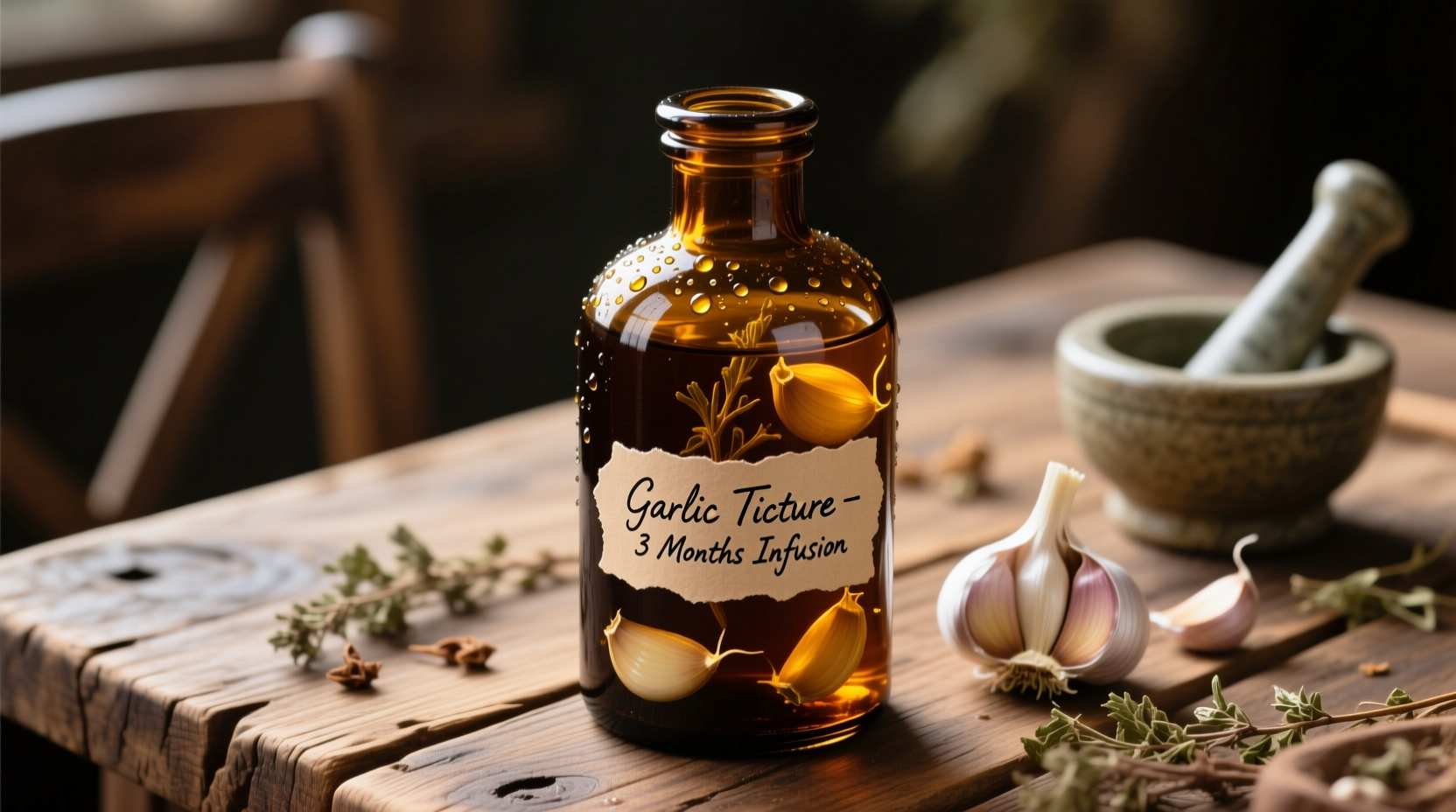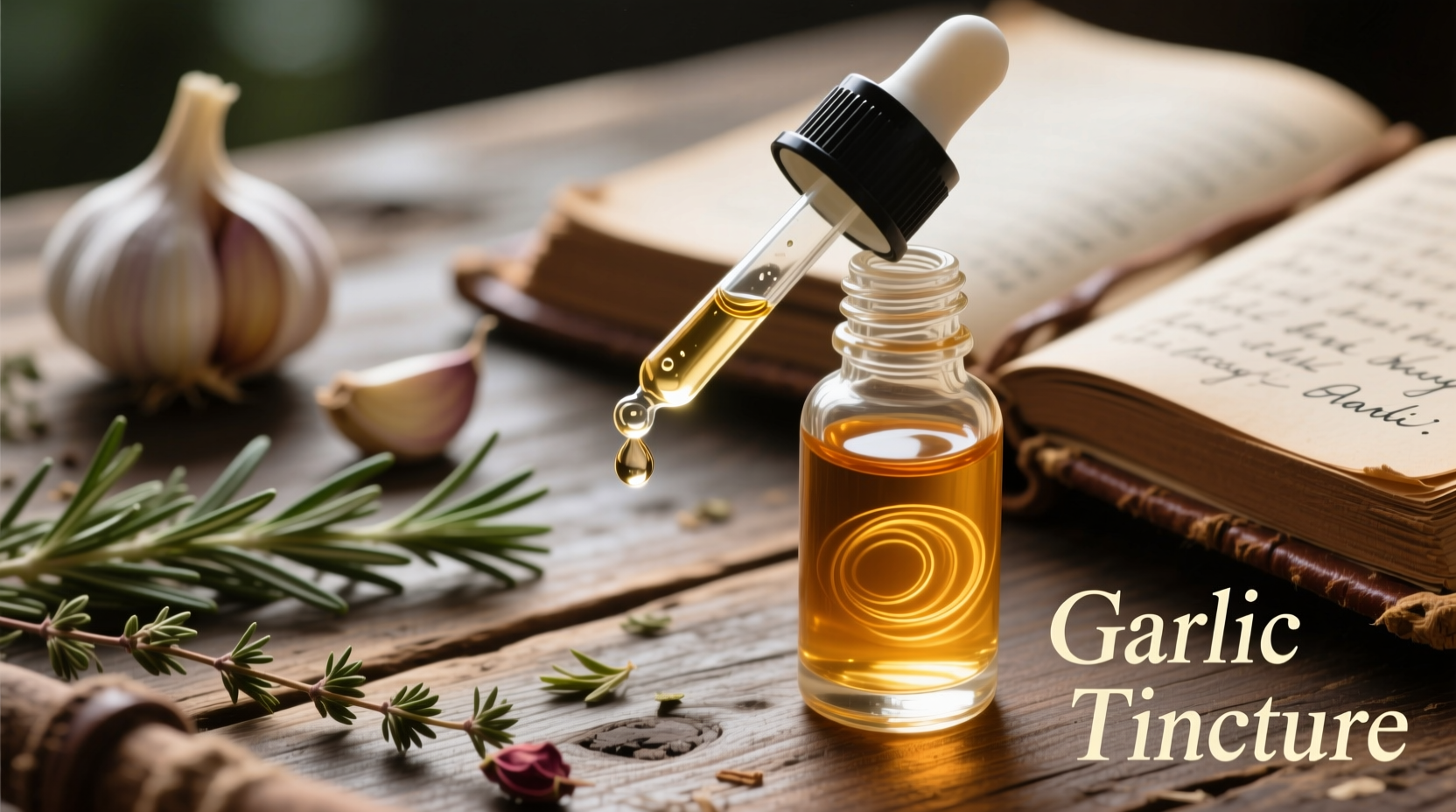Why This Guide Matters for Your Health Journey
Discover exactly how garlic tincture works, what science actually says about its potential benefits, and most importantly - how to use it safely and effectively. This guide cuts through the misinformation online with evidence-based information you can trust, helping you make informed decisions about incorporating garlic tincture into your wellness routine.
Understanding Garlic Tincture: More Than Just Liquid Garlic
Garlic tincture represents one of the most stable methods for preserving garlic's bioactive compounds. Unlike fresh garlic where allicin (the primary active compound) degrades within hours, a properly prepared tincture maintains these compounds for months or even years. The alcohol extraction process captures both water-soluble and fat-soluble components, creating a more comprehensive profile than many commercial supplements.
According to research published in the Journal of Agricultural and Food Chemistry, the ethanol extraction method used in tinctures preserves significantly higher levels of allicin derivatives compared to dried garlic powder supplements. This matters because allicin and its breakdown products are responsible for many of garlic's studied biological effects.

Garlic Through History: A Timeline of Medicinal Use
Garlic's therapeutic applications span millennia, with documented use across multiple ancient civilizations:
| Time Period | Civilization | Documented Uses |
|---|---|---|
| 3000-1500 BCE | Egyptian | Treatment for 22 ailments including infections and circulatory issues; provided to laborers building pyramids to maintain strength |
| 500 BCE | Greek | Hippocrates prescribed for respiratory problems, parasites, and poor digestion |
| 1st Century CE | Roman | Military physicians used for wound treatment and to prevent infections |
| 1500s-1800s | European | Common remedy for plague, tuberculosis, and as general antiseptic |
| World War I & II | Global | "Russian penicillin" - used as antiseptic when antibiotics were unavailable |
This historical timeline, documented by the National Center for Complementary and Integrative Health, shows garlic's enduring role in traditional medicine systems worldwide. Modern research continues to investigate many of these traditional applications.
What Science Says About Potential Benefits
Current research suggests garlic tincture may offer several health benefits, though important limitations exist:
- Cardiovascular support: A 2020 meta-analysis in Experimental and Therapeutic Medicine found garlic preparations showed modest reductions in blood pressure (average 5-8 mmHg) and LDL cholesterol levels
- Immune modulation: Research in Clinical Nutrition indicates garlic compounds may enhance certain immune cell functions, though human evidence remains limited
- Antimicrobial properties: Laboratory studies consistently show garlic extracts have activity against bacteria, viruses, and fungi, but clinical applications require more research
It's crucial to understand that most studies use standardized garlic preparations, not homemade tinctures. The National Institutes of Health states: "While garlic shows some promise for certain health conditions, the evidence is not strong enough to recommend it for any specific health problem."
Creating Effective Garlic Tincture: A Step-by-Step Guide
Proper preparation determines both the effectiveness and safety of your garlic tincture. Follow these evidence-based steps for optimal results:
Materials You'll Need
- Fresh organic garlic (6-8 large cloves)
- 80-100 proof vodka or food-grade ethanol (1 cup)
- Glass mason jar with tight lid
- Fine mesh strainer
- Amber glass dropper bottles for storage
The Extraction Process
- Preparation: Peel and finely chop or crush garlic cloves to activate alliinase enzyme
- Combination: Place garlic in jar and cover completely with alcohol (ratio 1:3 garlic to alcohol by volume)
- Steeping: Store in dark place at room temperature for 2-4 weeks, shaking daily
- Straining: Filter through cheesecloth then coffee filter to remove all particles
- Storage: Transfer to amber glass bottles, label with date, and store in cool, dark place
Research from the National Center for Biotechnology Information confirms that the 2-4 week extraction period maximizes allicin derivative preservation while minimizing degradation. The alcohol concentration is critical - below 60 proof won't adequately preserve compounds, while higher concentrations extract more complete phytochemical profiles.
Practical Usage Guidelines You Need to Know
Understanding proper dosage and application makes the difference between potential benefit and wasted effort:
Dosage Recommendations
- General wellness: 1-2 mL (30-60 drops) diluted in water or juice, once daily
- Short-term immune support: 2-3 mL (60-90 drops) diluted, up to twice daily for 7-10 days
- Always start with lower doses to assess tolerance
Important Timing Considerations
Take garlic tincture with food to minimize gastrointestinal discomfort. For cardiovascular support, evening dosing may align better with natural blood pressure rhythms. Avoid taking within 2 hours of bedtime if you experience digestive sensitivity.
When Garlic Tincture Isn't Appropriate: Critical Boundaries
Understanding the limitations of garlic tincture is as important as knowing its potential benefits. Consider these critical context boundaries:
| Situation | Recommendation | Reason |
|---|---|---|
| Taking blood thinners (warfarin, aspirin) | Avoid or use only under medical supervision | Garlic may increase bleeding risk |
| Upcoming surgery | Discontinue at least 1 week before procedure | Potential interference with blood clotting |
| Pregnancy or breastfeeding | Consult healthcare provider before use | Insufficient safety research |
| Active stomach ulcers | Avoid | May irritate gastric lining |
| Children under 12 | Not recommended | Lack of pediatric safety data |
These guidelines align with safety information from the National Library of Medicine. Always consult your healthcare provider before using garlic tincture if you have medical conditions or take prescription medications.
Garlic Tincture vs. Other Forms: Making Informed Choices
Not all garlic preparations deliver the same benefits. Understanding these differences helps you choose the right form for your needs:
- Fresh garlic: Highest allicin potential but degrades quickly; requires proper preparation (crushing and waiting 10 minutes before cooking)
- Aged garlic extract: Lower allicin but higher stable compounds like S-allylcysteine; better studied for cardiovascular benefits
- Garlic powder: Inconsistent allicin yield; quality varies significantly between brands
- Gelatin-coated tablets: Designed to survive stomach acid but may not release properly
- Garlic oil: Contains different compounds; primarily lipid-soluble components
Garlic tincture offers a middle ground - preserving both water and fat-soluble compounds while providing precise dosing. However, its alcohol content makes it unsuitable for some individuals.
Safety First: What You Must Know Before Using Garlic Tincture
While generally safe for most adults, garlic tincture can cause side effects and interactions:
- Common side effects: Heartburn, bad breath, body odor, digestive upset (typically dose-dependent)
- Serious concerns: Increased bleeding risk, potential interactions with HIV medications and blood pressure drugs
- Quality considerations: Homemade tinctures vary in potency; commercial products should list allicin potential
The U.S. Food and Drug Administration emphasizes that dietary supplements like garlic tincture aren't regulated as strictly as medications. They cannot claim to treat, cure, or prevent diseases, and product quality varies significantly.
Your Next Steps: Using Garlic Tincture Wisely
Garlic tincture can be a valuable addition to your wellness toolkit when used appropriately. Start with these practical steps:
- Consult your healthcare provider if you have medical conditions or take medications
- Begin with small doses to assess tolerance
- Track your experience in a journal for 2-4 weeks
- Discontinue use if you experience adverse effects
- Remember that garlic tincture complements - but doesn't replace - healthy lifestyle habits
For those interested in traditional preparation methods, Sophie Dubois' research on European herbal traditions confirms that proper extraction technique significantly impacts the final product's quality and effectiveness. The historical use of alcohol-based extracts demonstrates our ancestors' understanding of preservation methods that modern science continues to validate.
Frequently Asked Questions
How long does homemade garlic tincture last?
Properly prepared and stored in amber glass bottles away from light and heat, homemade garlic tincture maintains potency for 2-3 years. The alcohol acts as a preservative, but over time, the active compounds gradually degrade. Check for changes in color or smell as indicators of spoilage.
Can I use something other than alcohol to make garlic tincture?
While vinegar or glycerin can be used as alternatives, they extract different compounds and have shorter shelf lives. Alcohol (ethanol) is most effective at extracting both water-soluble and fat-soluble compounds and provides the longest preservation. Vinegar-based extracts last about 1 year, while glycerin extracts may separate and degrade more quickly.
Does garlic tincture really lower blood pressure?
Some studies show modest reductions in blood pressure (approximately 5-8 mmHg) with standardized garlic preparations, but research specifically on tinctures is limited. The effect varies significantly between individuals. Garlic should never replace prescribed blood pressure medication without medical supervision.
Why does my garlic tincture smell so strong?
The strong odor comes from volatile sulfur compounds that are preserved in the tincture. This is normal and indicates active compounds are present. The smell typically diminishes when diluted in water or juice before consumption. Stronger odor doesn't necessarily mean higher potency, as some beneficial compounds are less volatile.
Can I make garlic tincture with pre-minced garlic from the store?
Freshly prepared garlic is significantly better than pre-minced varieties, which often contain preservatives that interfere with the extraction process. Pre-minced garlic also begins losing its active compounds immediately after processing. For optimal results, always use fresh, organic garlic cloves that you prepare yourself just before making the tincture.











 浙公网安备
33010002000092号
浙公网安备
33010002000092号 浙B2-20120091-4
浙B2-20120091-4